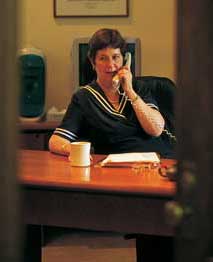|
Nancy
Dye's Presidency
by Mike McIntyre
Oberlin’s
13th president didn’t ride into town wearing a white hat, although
one does get that impression. The College was floundering, say some
Oberlin loyalists, when Nancy Schrom Dye was plucked in 1994 from
Vassar to guide Oberlin back to its rightful place as a paragon
of academics, arts, and social engagement. A college president wears
many hats, which in Dye’s case includes those of historian,
teacher, scholar, administrator, and—given that she is the
College’s first woman president—pioneer. But it’s
a hardhat that Dye deserves the most because she is, above all,
a builder.
 On
average, college presidents serve an institution for seven years—consistent
with the average tenure of Oberlin’s previous four leaders.
Dye is midway through year eight (she was awarded a five-year contract
extension in 1998) and in that time has worked to build consensus
and confidence on campus while shoring up a sense of respect and
reputation beyond Ohio, where the College is continually applauded
for its emphasis on academic seriousness, social engagement, and
artistic excellence. She’s presided over a construction boom
on campus—Peters Hall and the Allen Memorial Art Museum have
undergone a combined $8 million in renovations—and she has
overseen two of the College’s most ambitious building projects
to date—the nationally acclaimed Adam Joseph Lewis Center for
Environmental Studies and a 200,000-square-foot addition/expansion
of classrooms and labs for the sciences. Plans also call for additional
Conservatory and studio art space, a new student black box theater,
and renovations to residence halls. Dye herself was named one of
“The Year’s Most Interesting People” by Cleveland
Magazine and a “Woman of Achievement” by the YWCA of Greater
Cleveland. On
average, college presidents serve an institution for seven years—consistent
with the average tenure of Oberlin’s previous four leaders.
Dye is midway through year eight (she was awarded a five-year contract
extension in 1998) and in that time has worked to build consensus
and confidence on campus while shoring up a sense of respect and
reputation beyond Ohio, where the College is continually applauded
for its emphasis on academic seriousness, social engagement, and
artistic excellence. She’s presided over a construction boom
on campus—Peters Hall and the Allen Memorial Art Museum have
undergone a combined $8 million in renovations—and she has
overseen two of the College’s most ambitious building projects
to date—the nationally acclaimed Adam Joseph Lewis Center for
Environmental Studies and a 200,000-square-foot addition/expansion
of classrooms and labs for the sciences. Plans also call for additional
Conservatory and studio art space, a new student black box theater,
and renovations to residence halls. Dye herself was named one of
“The Year’s Most Interesting People” by Cleveland
Magazine and a “Woman of Achievement” by the YWCA of Greater
Cleveland.
To build something, be it a cutting-edge laboratory or a revitalized
faculty, is a work in progress. And if a new round of media accolades
is any indicator, Oberlin’s foundation is sound. The New York
Times last year labeled Oberlin a “thriving” elite liberal
arts college. This year’s Kaplan/Newsweek college guide lists
Oberlin as one of nine “hot” schools of 2002. Mother Jones
places the College among its top 10 activist schools of 2001, and
Wired magazine ranks Oberlin the fifth most-wired campus in the
United States. The College is ranked in the top 25 best liberal
arts colleges for Asian Americans by a Magazine and 11th among the
best colleges and universities for African Americans by Black Enterprise
magazine. The list goes on.
Hard numbers, however, tell the story best. More prospective students
submitted applications in 2001 then ever before, allowing the College
to be particularly selective in forming its freshman class. Just
39 percent of Arts and Sciences applicants were admitted last fall,
compared to 72 percent prior to Dye’s arrival in 1994. The
yield rate—admitted students who actually enroll for classes—was
a healthy 35 percent, up 9 percent from 1994.
The Conservatory yields another success. A very selective 27 percent
of nearly 1,000 applicants were admitted to the Class of 2005. Fifty
percent of those students began classes last fall—a terrific
yield—and a record 57 students matriculated in Oberlin’s
double-degree program.
And fundraising—aided by a greater sense of alumni confidence—is
robust. Two of the last three years saw the highest-ever levels
of alumni giving, with pledges and gifts totaling more than $36
million in 1998-99 and again in 1999-00. Just halfway through its
capital campaign, Oberlin has raised $119.2 million—almost
three-fourths of its $165 million goal. The most ambitious in the
institution’s history, the campaign will fund much of the new
construction while also targeting scholarships, faculty salaries,
and specific academic programs.
Recruitment and fundraising numbers are among the vital signs of
any college’s health, rather like a constantly monitored cholesterol
count. But there are other signs that Oberlin is thriving. There
is a skip in the institution’s step, a rosy complexion even
on the grayest Ohio days. In short, Oberlin is feeling like its
old self again.
Go
to page 1 | 2
| 3 | 4
| 5 of Nancy Dye's Presidency
|



 On
average, college presidents serve an institution for seven years—consistent
with the average tenure of Oberlin’s previous four leaders.
Dye is midway through year eight (she was awarded a five-year contract
extension in 1998) and in that time has worked to build consensus
and confidence on campus while shoring up a sense of respect and
reputation beyond Ohio, where the College is continually applauded
for its emphasis on academic seriousness, social engagement, and
artistic excellence. She’s presided over a construction boom
on campus—Peters Hall and the Allen Memorial Art Museum have
undergone a combined $8 million in renovations—and she has
overseen two of the College’s most ambitious building projects
to date—the nationally acclaimed Adam Joseph Lewis Center for
Environmental Studies and a 200,000-square-foot addition/expansion
of classrooms and labs for the sciences. Plans also call for additional
Conservatory and studio art space, a new student black box theater,
and renovations to residence halls. Dye herself was named one of
“The Year’s Most Interesting People” by Cleveland
Magazine and a “Woman of Achievement” by the YWCA of Greater
Cleveland.
On
average, college presidents serve an institution for seven years—consistent
with the average tenure of Oberlin’s previous four leaders.
Dye is midway through year eight (she was awarded a five-year contract
extension in 1998) and in that time has worked to build consensus
and confidence on campus while shoring up a sense of respect and
reputation beyond Ohio, where the College is continually applauded
for its emphasis on academic seriousness, social engagement, and
artistic excellence. She’s presided over a construction boom
on campus—Peters Hall and the Allen Memorial Art Museum have
undergone a combined $8 million in renovations—and she has
overseen two of the College’s most ambitious building projects
to date—the nationally acclaimed Adam Joseph Lewis Center for
Environmental Studies and a 200,000-square-foot addition/expansion
of classrooms and labs for the sciences. Plans also call for additional
Conservatory and studio art space, a new student black box theater,
and renovations to residence halls. Dye herself was named one of
“The Year’s Most Interesting People” by Cleveland
Magazine and a “Woman of Achievement” by the YWCA of Greater
Cleveland.